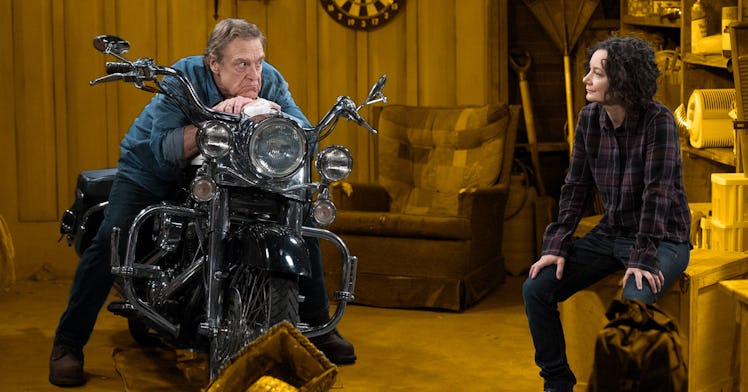Roseanne Barr Accidentally Made ‘The Conners’ the Most Interesting Show on TV
Why a strange reboot suddenly become super relevant.

There are two good reasons someone with zero interest in watching The Conners should watch the Roseanne reboot’s debut. Reason one: Roseanne Barr, who was fired for public displays of racism, is no longer on the show. Reason two: Barr’s conspicuous absence has forced the show to engage with the cultural moment in a complicated, compelling way.
In the spring of 2017, when Roseanne returned to TV after a two-decade gap, the show was a runaway hit. But, after it had been on the air for only two months, half of the 18.2 million viewers who watched the two-episode premiere were gone. To be clear, the ratings for Roseanne dropped before Barr infamously posted racist tweets aimed a Valerie Jarrett. Why? Here’s a theory: The reason people tuned in to watch the new Roseanne was to witness a spectacle. Barr was the spectacle, not the show, so people peaced.
Now, precisely because of the contentious nature of Barr’s firing, a skirmish in the ongoing culture wars, the show itself is a spectacle. And that’s a good thing because, somewhat paradoxically, it has forced the writers to take a more subtle and interesting approach. The character of Roseanne was a Trump supporter who sparred with her husband Dan (John Goodman) about his left-leaning politics. It was a fine setup, but the character was too broad. Roseanne was not a Rorschach test. She was more of a convention banner. If you agreed with her, you agreed. If you disagreed, you disagreed. Either way, the show got dull. The dynamic was more engaging in the nineties.
The original Roseanne ran from 1988 to 1997, nine seasons (on par with Seinfeld). And, because it aired in the same era as Seinfeld, and on a rival network (Seinfeld was on NBC, Roseanne on ABC) Roseanne, in theory, competed with the ur-sitcom for an audience, albeit on its own terms. Seinfeld (and later Friends) provided escapism for people with kids because the characters were all single, childless and living in a bizarrely affordable version of New York City. These sitcoms were like old Woody Allen movies without the literary references or the sexism (well, less of the sexism). Roseanne was the opposite: It was intended to mirror family life in middle America, not provide an escape from it. As the titular matriarch of her own show, the fictional version of Roseanne Barr was relatable in a way that Jerry Seinfeld and all the Friends never could be. She felt like a real person. So did her husband. So did her kids (well, a little less so).
Now, the context of the show has changed. The Conners follows the rest of the family. ABC has been very secretive the fate of the show’s main character. That makes sense given the rise of “spoiler” culture and ABC’s desire for buzz. Still, we know this: The Conners is now about a family living in a fractional and divided America. Whether or not this is the text or subtext of the show doesn’t matter. That’s what it’s about. And that’s a show that is sorely needed at a time when networks are responding to culture strife with flavorless fare a la Young Sheldon.
The press and trailers for The Conners might make you think John Goodman will be the new focus of the show, but this has always been a show about a wise-cracking matriarch, not some clueless guy who is essentially likable. Though the specter of Roseanne is certainly part of the appeal of The Conners, the reason why the show will likely succeed (at least at first) has nothing to do with her. The show has legs because Darlene (Sarah Gilbert) is a down-to-earth matriarch with mass appeal. The good and interesting things about the fictional character of Roseanne have found new life in the fictional character of Darlene even though real life Roseanne isn’t allowed on set. But, the world of TV still values her vitriol. There were consequences for Roseanne in real life, but her fictional character’s spirit lives on with Darlene.
Does TV need some version of Roseanne to counter the escapism of other sitcoms? The answer it seems is yes, and perhaps even more urgently, without her specifically. Roseanne Barr didn’t invent the shooting-from-the-hip firebrand her fictional alter ego embodied, but she did help to perfect it. But now, thanks to the success (and failure) of Roseanne we don’t need Roseanne anymore. The real reason a divided nation tuned-in to the new Roseanne last year was to watch, what was essentially an ugly grudge-match. But now, the sitcom is trying to do something new. What happens to a family in when the demagogue leaves? (What happens to a country?)
The Conners is more interesting than Roseanne because it’s not about the argument. It’s about an attempt to find common ground or resolution. It’s about how hard that is within families and within America more broadly. Barr may have made the show timely by accident, but that doesn’t change the result: ABC is making a sitcom about family life lived on shakey ground. That’s great. Primetime needed The Conners more than it needed Roseanne Barr.
The Conners debuts on ABC on October 16 at 8 pm EST.